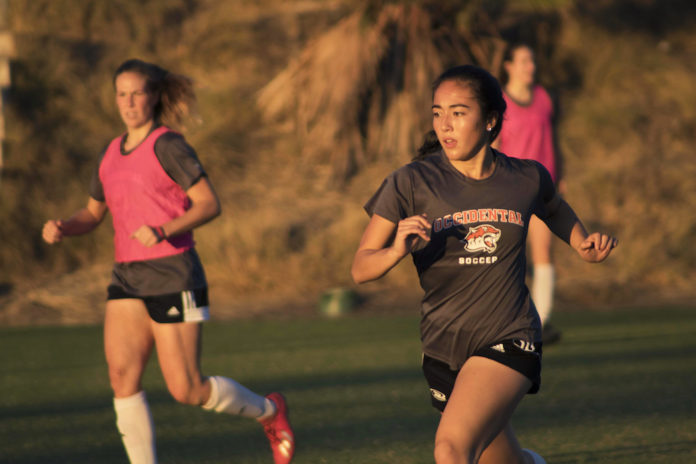
This October, the Council on Undergraduate Research awarded Occidental the 2019 Campus-Wide Award for Undergraduate Research Accomplishments (AURA) in recognition of the college’s vast number of student researchers from a wide variety of disciplines. With the Undergraduate Research Center (URC) supporting 350 students in their research projects annually and with 20 percent of students participating in Division III athletics at Occidental, some students seize the opportunity to engage in research and athletics in addition to a full load of classes.
Lori Berberian (senior) is a geology major, attacker utility player on the women’s water polo team and researcher of paleoclimate and sedimentology in Iceland. Berberian’s research involves two projects, which she has worked on for several years. The first investigates the onset and driving factors behind soil erosion in the central region of Iceland. The second is a chronology of volcanic events in Iceland, which helps create a timeline to reconstruct past environments. According to Berberian, the skillset necessary to be a successful researcher is quite similar to that of a collegiate athlete.
“An important skill is being able to work with others, and being in a team environment definitely taught me that,” Berberian said. “Even in the field when we go on these trips to Iceland, my ability to work in group settings resonates from things I’ve developed as an athlete.”
Berberian said she devotes 20–25 hours a week to water polo and then matches that amount of time conducting research.
“I feel like the skills I’ve learned or acquired as an athlete help me manage a busy schedule. I think because I’ve liked the research so much, I’ve figured out a way to balance both,” Berberian said.
Berberian plans to continue her education and research in geoscience and environmental science in a Ph.D. program. Berberian said a lot of aspects of her research have to do with our changing climate and the effects humans have on the environment, both past and present.
“I would like for my research to eventually inform policy or be translated to a broader audience,” Berberian said.
Kia Mackey (junior) is a forward on the women’s soccer team and biology major studying strep throat bacteria in professor Cheryl Okumura’s lab. According to Mackey, there is currently no vaccine for strep throat, which is treated using antibiotics.
“Antibiotic resistance has become a big problem, and so if we can look at ways that the bacteria invade our immune system, hopefully, we can prevent it and have a vaccine rather than treating it with antibiotics,” Mackey said.
Mackey typically conducts experiments where she infects cells with the streptococcus bacteria and then runs tests to determine the effects, such as different protein expression.
“Sometimes I’ll be physically running from lab to practice if an experiment runs long,” Mackey said.
Mackey is enrolled in two credits of research during the soccer season, and she hopes to do more hours out of season. Mackey devotes up to 18 hours a week to soccer and around five hours to her research.
“It’s a lot of eating and doing homework at the same time, or just planning ahead and prioritizing my time,” Mackey said. “I do feel like I am very cramped on time during season, running from place to place, but they’re both things that I like to do and that I’m passionate about, so it’s worth it to make everything fit.”
Lucy Kolpa (senior) is a biology major with an environmental emphasis and a member of the cross country and track teams. Kolpa works in professor Elizabeth Braker’s lab, which studies tropical ecology. This summer, Kolpa went with Braker to La Selva Biological Station in Costa Rica to study Pentoclethera Macroloba (PMAC), the most dominant tree in the forest. Her main project is cataloging the life history of the caterpillars that feed on this tree.
“There is not that much information on this tree, which is crazy considering how vast it is throughout the forest, so I’m trying to help fill in the knowledge gaps to paint a more complete picture of PMAC and the roles it plays in the La Selva forest,” Kolpa said.
Kolpa is analyzing the data she collected in Costa Rica over the summer, which involves cataloging species and further identifying them taxonomically. Kolpa said PMACs are a large carbon source in the forest and invest a lot of energy in their chemical defenses. She is exploring the chemical ecology of the caterpillars that feed on PMACs because some caterpillars are able to build their chemical defenses based on the compounds in their diet.
“A ton of different species of caterpillars are actually eating this tree, and that’s really interesting because a caterpillar is super vulnerable — it’s this squishy bug that doesn’t really have an exoskeleton,” Kolpa said. “It’s interesting that a caterpillar is able to sustain its life and mature fully to adulthood with the PMAC tree.”
Kolpa said she hopes to find out if PMAC is able to give the caterpillars the compounds and fuel they need to secrete chemical defenses. According to Kolpa, much like her research, her athletic career as a distance runner requires patience and endurance.
“You can’t just be really good at running an almost four-mile race, you have to train to do that. I think that the discipline of just teaching myself that I will get results if I put in the work and do a little bit every day has definitely carried out to my academic success,” Kolpa said. “Even if it’s just dedicating 45 minutes a day to research the caterpillars in Costa Rica. It’s a really good lesson that putting a little bit in every day, you’ll end up seeing much larger results.”
![]()



































